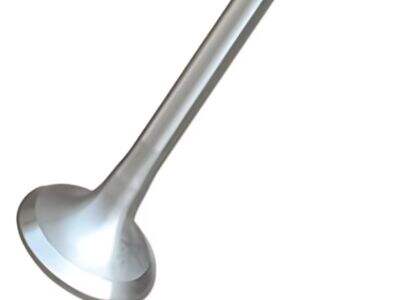We all think of a lot of things when we think of a car. Wheels will come in our mind, the engine, seats and all the other parts. However, have you ever thought about the little components you need to make your car run and operate? So, one of the most important parts of the engine is the Engine Valve. It is a small part but it has a huge and important role in the performance of the engine.
How the Valve Works:
Now, let's examine the engine valve so closely to see what it has and how critical it is. A valve's primary role is to regulate the intake of the air and fuel entering the engine, and to assist with expelling the exhaust gases after the fuel has been combusted. It reopens and closes extremely quickly, and in some cases hundreds of times a minute. In addition, it works also under very high temperatures, that could go as high as 1100°F. That's hotter than just boiling water. That is why this valve must be made pretty to endure all that temp.
Making Engine Valves:
But first, having learned about the way in which the valve functions, let's delve into about its manufacturing process. The manufacturing process can affect how good or bad an engine valve is. There are two main ways to makes valves; forging and casting. A forged valve is produced by taking a solid piece of heated metal and placing it in a press or hammer to shape the metal. This gives the metal an incredible amount of strength. In contrast, cast valves consist of hot, melted metal, poured into a mold that cools into shape. Both have their pros and cons, though forged valves are widely considered the stronger and more reliable option.
What Makes a Good Valve:
Underneath are a few essential consideration when looking for a fine high quality engine valve; The very first thing to take into account is the fabric of which the valve is made. Car engine valve are typically composed of hard materials such as steel, titanium, or aluminum. Which material is the best depends on the application and environment in which the engine will be used. Another example is engines built for racing may require a different type of valves than a regular car. The valve design is another influential component. That's components such as the valve head shape, the valve stem size and the angle at which the valve rests, among others. Each of these aspects of design can influence the effectivity of the valve.
Keeping the Valve Strong:
Third, consider how long the valve is going to last. A valve should be able to resist high temperature, friction, and wear during its life. That means it needs to be built durable enough to prevent harm. The valve also needs to be highly resistant; even the surface of the valve must be hardened in order not to lose strength and they usually have special treatment for the surface to prevent rust and corrosion. Another important component of a valve is the stem seal. Which means, stem seal prevents oil from entering the combustion chamber. Bad news: If oil ends up in there then engine damage occurs.
Choosing the Right Valve:
The next consideration is how to select the valve best suited to your engine. Here are a few things you need to take into consideration while choosing a valve. You have to consider how the engine will be played, what types of conditions it will face and of what fuel it will use. In another example, if you have a high RPM high-temperature engine, you need the appropriate valves that can withstand the destructive nature of the application.
So what does all of that have to do with you and your car? This makes it even more vital to use quality engine parts. Quality parts ensure that your vehicle performs, operates, and endures a long time. Topu strives to deliver the finest engine valves to fulfill the requirements of modern cars. We use advanced technology with high quality material to deliver long-lasting performance of our valves. We also provide special valves tailored specifically for certain engine models.
Overall, the engine valve may be a tiny component, yet they have a huge impact on engine performance and longevity. The quality of the engine valve is mainly determined by four aspects, namely the valve material, the valve process, the valve structure, and the valve durability. Overall, picking the valve specifically designed for your engine will contribute to your car running smooth and strong for many miles to come. Topu — Your Destination for Quality Engine Valves for Your Car Needs.

 EN
EN
 AR
AR
 BG
BG
 HR
HR
 CS
CS
 DA
DA
 NL
NL
 FI
FI
 FR
FR
 DE
DE
 EL
EL
 IT
IT
 JA
JA
 KO
KO
 NO
NO
 PL
PL
 PT
PT
 RO
RO
 RU
RU
 ES
ES
 SV
SV
 TL
TL
 IW
IW
 ID
ID
 LV
LV
 LT
LT
 SR
SR
 UK
UK
 TR
TR
 MS
MS
 BE
BE
 HY
HY
 AZ
AZ
 KA
KA
 EO
EO
 LA
LA
 SU
SU
 TG
TG
 UZ
UZ



